13 Best Herbal Tinctures For Nasal Congestion
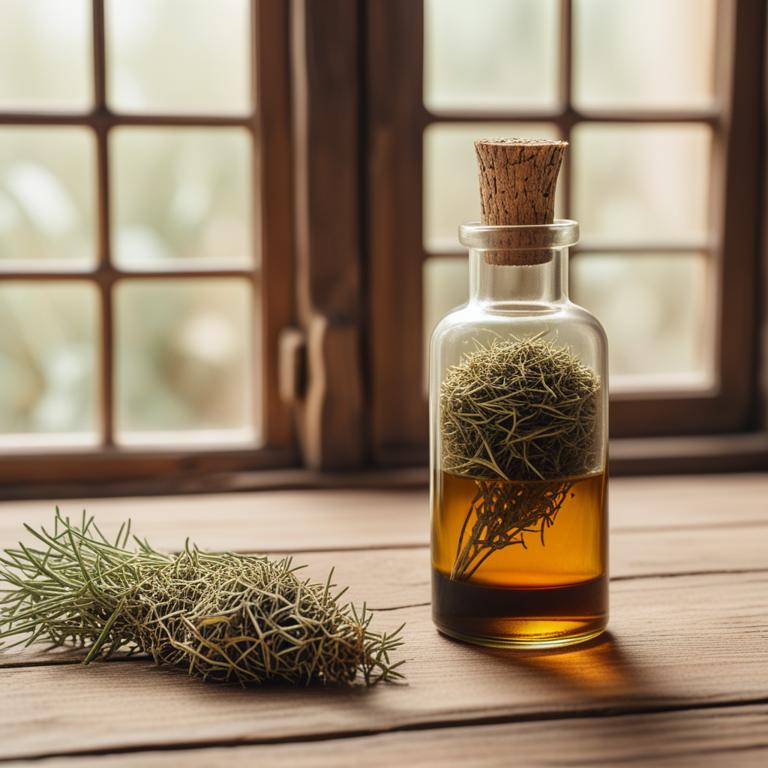
Herbal tinctures for Nasal congestion are liquid extracts made from plants and herbs that are used to treat sinus pressure, stuffiness, and congestion.
These herbal remedies have numerous benefits, including being non-invasive, natural, and effective in alleviating symptoms without causing side effects.
Examples of herbal tinctures that can help treat nasal congestion include eucalyptus, which helps to loosen mucus and clear airways; peppermint, which reduces inflammation and congestion; ginger, which has anti-inflammatory properties and helps to thin mucus; and nettle leaf, which has antihistamine properties and helps to reduce swelling.
Additionally, other beneficial herbal tinctures for nasal congestion include elderberry, which has antiviral properties and helps to combat infections; thyme, which has antimicrobial properties and helps to fight off bacteria; and licorice root, which has anti-inflammatory properties and helps to soothe and calm nasal passages.
According to "Turkish archives of otorhinolaryngology", tinctures for nasal congestion using extracts of five medicinal plants, such as those found in preparation Sinulan forte, may be a safe and effective treatment for acute postviral rhinosinusitis, with significantly lower absolute post-treatment scores and better relative improvement compared to intranasal corticosteroid spray therapy.
Below there's a list of the 13 best herbal tinctures for nasal congestion.
- 1. Echinacea purpurea tinctures
- 2. Echinacea angustifolia tinctures
- 3. Eucalyptus globulus tinctures
- 4. Glycyrrhiza glabra tinctures
- 5. Sambucus nigra tinctures
- 6. Melissa officinalis tinctures
- 7. Zingiber officinale tinctures
- 8. Lavandula angustifolia tinctures
- 9. Rosmarinus officinalis tinctures
- 10. Astragalus membranaceus tinctures
- 11. Panax quinquefolius tinctures
- 12. Angelica sinensis tinctures
- 13. Schisandra chinensis tinctures
Also you may be interested in...
TODAY'S FREE BOUNDLE
Herb Drying Checklist + Herbal Tea Shopping List + Medicinal Herbs Flashcards
Enter you best email address below to receive this bundle (3 product valued $19.95) for FREE + exclusive access to The Aphotecary Letter.
$19.95 -> $0.00
1. Echinacea purpurea tinctures

Echinacea purpurea tinctures have been used to treat nasal congestion due to their anti-inflammatory and immunomodulatory properties, which help to reduce swelling and congestion in the nasal passages.
The bioactive constituents of Echinacea purpurea, including alkylamides, caffeic acid derivatives, and flavonoids, work together to inhibit the production of pro-inflammatory cytokines and enzymes that contribute to nasal congestion.
By reducing inflammation and modulating the immune response, Echinacea purpurea tinctures help to alleviate nasal congestion and promote sinus drainage, providing relief from symptoms such as stuffiness and sinus pressure.
The benefits of using Echinacea purpurea tinctures to treat nasal congestion include their natural and non-invasive approach, making them a popular choice for those seeking a holistic alternative to conventional treatments.
Related Study
According to "The Cochrane database of systematic reviews", Echinacea purpurea tinctures may be better than a placebo in alleviating nasal congestion, but there is not enough evidence to recommend its use for this specific condition.
2. Echinacea angustifolia tinctures

Echinacea angustifolia tinctures have been traditionally used to treat nasal congestion due to their anti-inflammatory properties, which help to reduce swelling and ease congestion.
The bioactive constituents present in Echinacea angustifolia, such as alkylamides, glycosides, and phenolic acids, contribute to its ability to combat nasal congestion by inhibiting the production of pro-inflammatory cytokines and enzymes.
By promoting a healthy immune response and reducing inflammation, Echinacea angustifolia tinctures can help to alleviate nasal congestion and promote a sense of relief.
The benefits of using Echinacea angustifolia tinctures to treat nasal congestion include a reduced risk of complications, a faster recovery time, and a more effective management of symptoms.
3. Eucalyptus globulus tinctures

Eucalyptus globulus tinctures have been traditionally used to treat nasal congestion, a common respiratory issue characterized by stuffy nose and difficulty breathing.
The properties of this herbal preparation that help to treat this ailment include its decongestant, anti-inflammatory, and expectorant properties, which work together to relieve congestion and promote sinus drainage.
The bioactive constituents of Eucalyptus globulus tinctures, including eucalyptol, a volatile oil, and flavonoids, help to treat nasal congestion by reducing inflammation, thinning mucus, and relieving bronchospasm.
The benefits of using Eucalyptus globulus tinctures to treat nasal congestion include fast and effective relief, reduced risk of complications, and a natural alternative to pharmaceutical medications.
4. Glycyrrhiza glabra tinctures

Glycyrrhiza glabra tinctures have been traditionally used to treat nasal congestion due to their anti-inflammatory and decongestant properties.
The herbal preparation helps to treat this ailment by reducing swelling and congestion in the nasal passages, allowing for easier breathing.
The bioactive constituents of Glycyrrhiza glabra tinctures, including glycyrrhizin and flavonoids, are responsible for their therapeutic effects, which help to alleviate nasal congestion and promote respiratory health.
The benefits of using Glycyrrhiza glabra tinctures to treat nasal congestion include rapid relief from congestion, improved breathing, and a reduced risk of complications associated with prolonged nasal congestion.
Related Study
According to "Mini reviews in medicinal chemistry", Glycyrrhiza glabra tinctures for nasal congestion may be effective due to its pharmacological actions, including modulating the immune system, inhibiting virus growth, and producing anti-inflammatory activity, which could help alleviate symptoms of nasal congestion caused by viral and bacterial respiratory infections.
5. Sambucus nigra tinctures
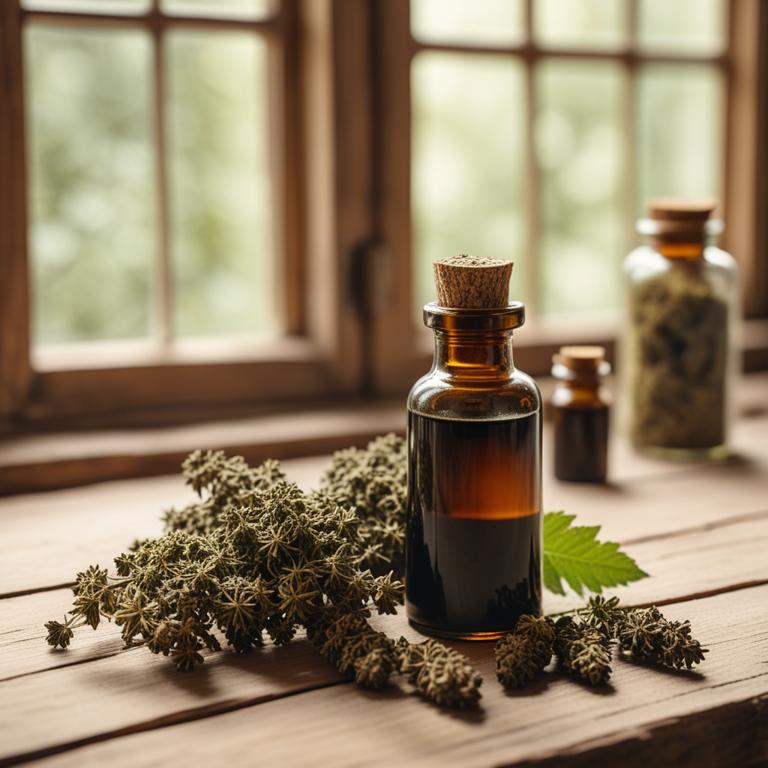
Sambucus nigra tinctures have been traditionally used to treat nasal congestion, a common symptom of colds and allergies, by helping to reduce inflammation and relieve congestion in the nasal passages.
The antiviral and anti-inflammatory properties of Sambucus nigra tinctures, particularly its high content of flavonoids, phenolic acids, and anthocyanins, contribute to its effectiveness in treating this ailment.
These bioactive constituents help to reduce the production of mucus, ease congestion, and promote a healthy respiratory system, providing quick relief from nasal congestion.
The benefits of using Sambucus nigra tinctures to treat nasal congestion include natural, non-invasive relief, reduced risk of side effects, and the ability to promote overall immune function, making it a popular herbal remedy for this common condition.
Related Study
According to "Postgraduate medicine", Sambucus nigra tinctures for nasal congestion, as part of the herbal medicinal product BNO 1016, have been found to reduce nasal congestion symptoms in patients with acute rhinosinusitis, with a reduction in the Major Symptom Score (MSS) of 1.9 points and improvement in quality of life (QoL) for patients by improving SNOT-20 by 3.5 points when compared to placebo.
6. Melissa officinalis tinctures
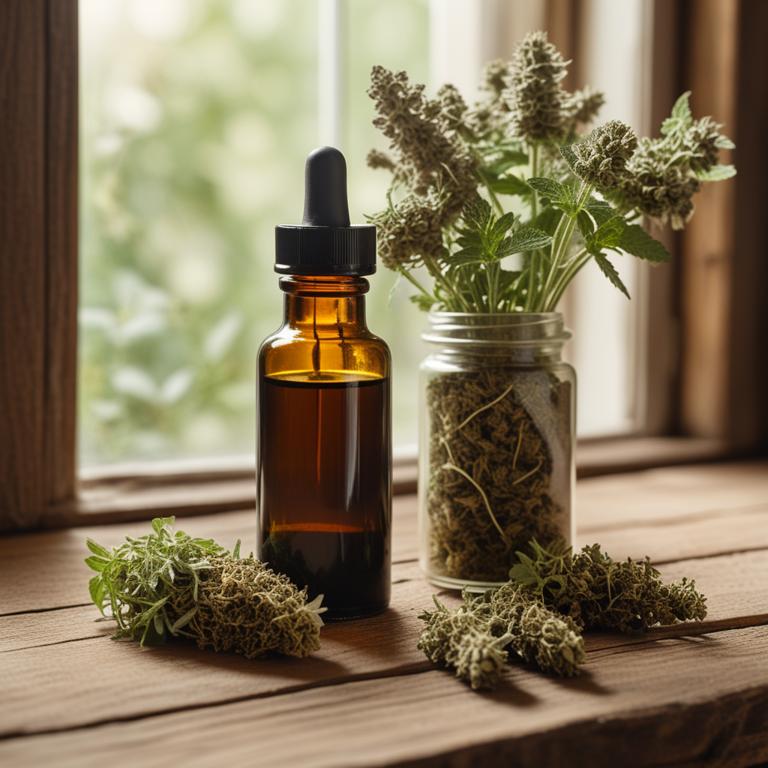
Melissa officinalis tinctures, derived from the leaves of the lemon balm plant, have been traditionally used to treat nasal congestion due to their decongestant and expectorant properties.
The bioactive constituents, including rosmarinic acid, eugenol, and beta-caryophyllene, help to reduce inflammation and open up airways, making it easier to breathe.
By stimulating the nasal passages and promoting the release of mucus, Melissa officinalis tinctures provide relief from congestion and sinus pressure, allowing individuals to breathe more easily.
Regular use of Melissa officinalis tinctures can also help to reduce the frequency and severity of nasal congestion episodes, promoting overall respiratory health.
Related Study
According to "Turkish archives of otorhinolaryngology", Melissa officinalis tinctures for nasal congestion showed a significantly lower absolute post-treatment score and better relative improvement compared to the intranasal corticosteroid spray therapy.
7. Zingiber officinale tinctures

Zingiber officinale tinctures have been traditionally used to treat nasal congestion due to their anti-inflammatory and decongestant properties.
The bioactive constituents, including gingerols and shogaols, present in these tinctures help to reduce swelling in the nasal passages and sinuses, thereby alleviating congestion.
By inhibiting the production of pro-inflammatory enzymes and compounds, these compounds help to relieve nasal congestion and promote clear breathing.
The benefits of using Zingiber officinale tinctures to treat nasal congestion include rapid relief from congestion, reduced risk of complications, and a natural alternative to conventional medications.
Related Study
According to Turkish archives of otorhinolaryngology, Zingiber officinale tinctures for nasal congestion show effective results, as indicated by a significantly lower absolute post-treatment score for nasal congestion in patients receiving the herbal preparation Sinulan forte® in the treatment of acute postviral rhinosinusitis.
8. Lavandula angustifolia tinctures

Lavandula angustifolia tinctures have been traditionally used to treat nasal congestion due to their decongestant and anti-inflammatory properties.
The bioactive constituents of this herbal preparation, including linalool and linalyl acetate, help to reduce swelling and ease congestion in the nasal passages.
These compounds work by inhibiting the release of pro-inflammatory mediators and relaxing the smooth muscle in the nasal passages, allowing for easier breathing.
The benefits of using Lavandula angustifolia tinctures to treat nasal congestion include natural and non-invasive relief, reduced reliance on over-the-counter medications, and minimal side effects.
Related Study
According to "Turkish archives of otorhinolaryngology", Lavandula angustifolia tinctures, which are part of the Sinulan forte preparation, were found to be effective in reducing nasal congestion in patients with acute postviral rhinosinusitis.
9. Rosmarinus officinalis tinctures
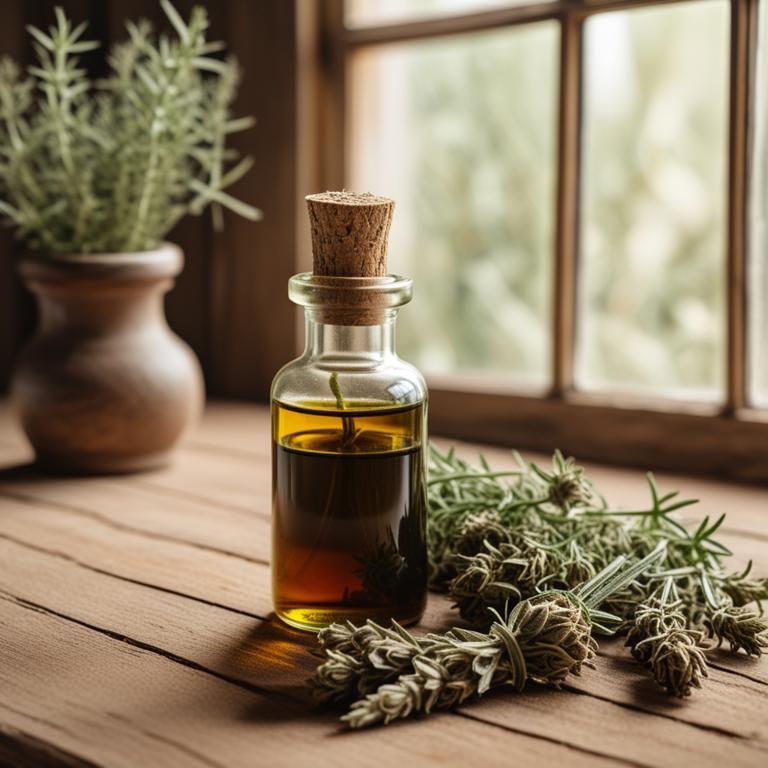
Rosmarinus officinalis tinctures have been traditionally used to treat nasal congestion due to their decongestant and expectorant properties, which help to relieve stuffiness and congestion by loosening mucus and promoting its expulsion from the nasal passages.
This herbal preparation is particularly effective in treating nasal congestion caused by allergies and colds, thanks to its ability to reduce inflammation and improve respiratory function.
The bioactive constituents of Rosmarinus officinalis, including camphor, borneol, and borneol acetate, contribute to its decongestant and expectorant properties, making it an effective natural remedy for nasal congestion.
Regular use of Rosmarinus officinalis tinctures can provide relief from nasal congestion, improve breathing, and reduce the risk of secondary infections, making it a valuable addition to any natural health regimen.
Related Study
According to "Turkish archives of otorhinolaryngology", Rosmarinus officinalis tinctures for nasal congestion showed significantly lower absolute post-treatment scores and better relative improvement when used as part of the herbal preparation Sinulan forte® in treating acute postviral rhinosinusitis (APRS).
10. Astragalus membranaceus tinctures
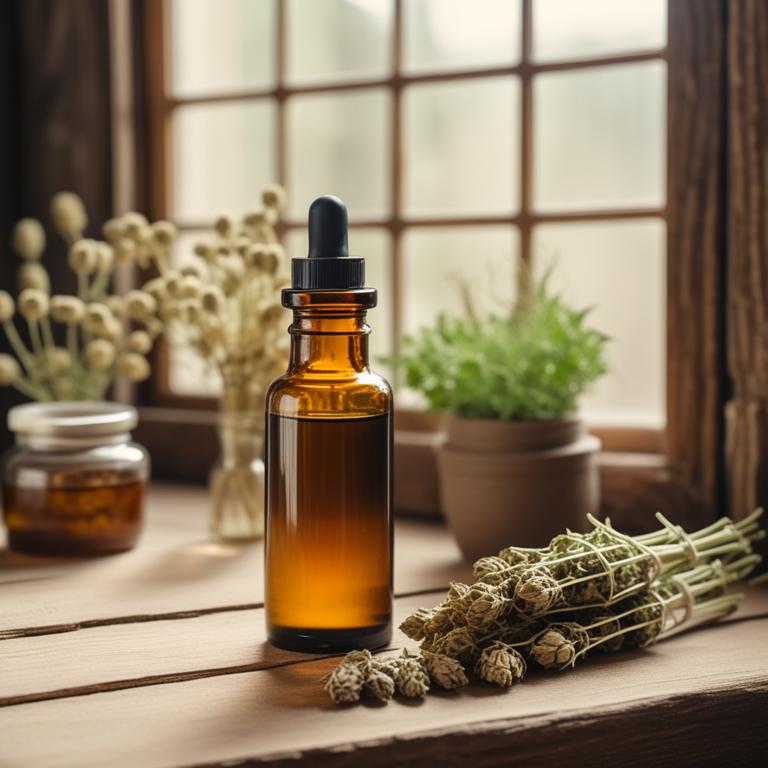
Astragalus membranaceus tinctures have been traditionally used to treat nasal congestion due to their anti-inflammatory and antiviral properties, which help to reduce swelling and combat infections in the nasal passages.
The bioactive constituents present in Astragalus membranaceus, including flavonoids, saponins, and polysaccharides, play a crucial role in alleviating nasal congestion by modulating the immune system and preventing the replication of viral particles.
The use of Astragalus membranaceus tinctures has been found to be beneficial in treating nasal congestion by promoting expectoration, reducing mucus production, and improving respiratory function, thereby providing relief from symptoms such as stuffiness and congestion.
Regular use of Astragalus membranaceus tinctures has been reported to offer long-term benefits, including improved respiratory health and enhanced immune system function, making it a popular natural remedy for treating nasal congestion.
Related Study
According to Turkish archives of otorhinolaryngology, Astragalus membranaceus tinctures have shown significant improvement in symptoms of nasal congestion in patients with acute postviral rhinosinusitis.
11. Panax quinquefolius tinctures

Panax quinquefolius tinctures, derived from the American ginseng plant, have been used to treat nasal congestion due to their anti-inflammatory and expectorant properties.
The bioactive constituents, including ginsenosides, help to alleviate congestion by reducing swelling in the nasal passages and promoting the clearance of mucus.
By acting as a natural decongestant, Panax quinquefolius tinctures help to ease breathing and relieve nasal congestion, providing relief from symptoms associated with colds and flu.
The benefits of using Panax quinquefolius tinctures for nasal congestion treatment include their non-invasive nature, minimal side effects, and potential for long-term relief from recurring congestion issues.
12. Angelica sinensis tinctures
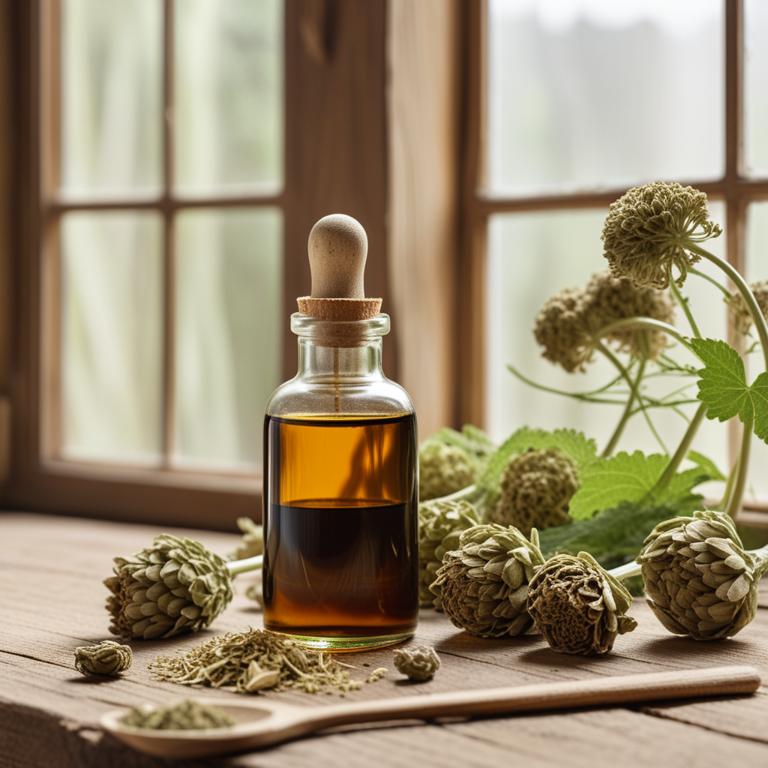
Angelica sinensis tinctures, a traditional herbal remedy, have been widely used to treat nasal congestion due to their expectorant, anti-inflammatory, and antiviral properties.
The bioactive constituents of Angelica sinensis, including ferulic acid, isorhapontigenin, and ligustilide, help to alleviate nasal congestion by reducing inflammation, relieving cough, and promoting the discharge of mucus.
The tinctures work by increasing the production of mucolytic enzymes, which break down thick mucus and facilitate its expulsion from the respiratory tract, thereby providing quick relief from nasal congestion.
The benefits of using Angelica sinensis tinctures for nasal congestion include reduced symptoms, improved respiratory function, and a faster recovery time, making it a popular natural remedy for this common ailment.
13. Schisandra chinensis tinctures
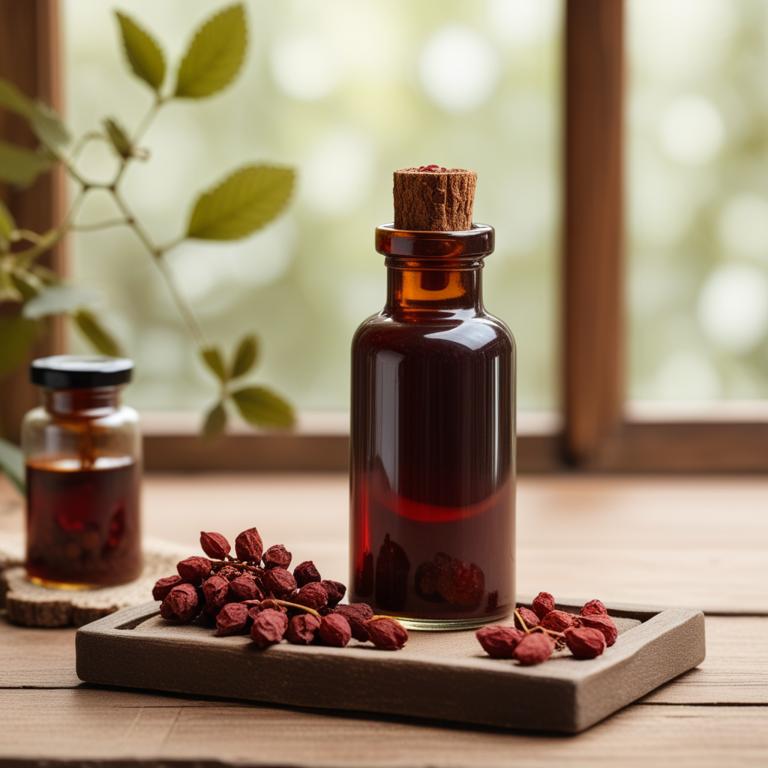
Schisandra chinensis tinctures are herbal preparations that have been traditionally used to treat nasal congestion, a common symptom of respiratory issues such as colds and flu.
The bioactive constituents of Schisandra chinensis, including lignans, flavonoids, and polysaccharides, have been found to possess anti-inflammatory and immune-modulating properties, which help to alleviate nasal congestion by reducing swelling and promoting mucus clearance.
The benefits of using Schisandra chinensis tinctures to treat nasal congestion include rapid relief from congestion, reduced risk of secondary infections, and improved overall respiratory health.
Regular use of Schisandra chinensis tinctures may also help to boost the immune system, making it easier to fight off underlying infections and recover from illness.
Related Study
According to "Turkish archives of otorhinolaryngology", Schisandra chinensis tinctures, part of the Sinulan forte preparation, were found to be effective in reducing nasal congestion in patients with acute postviral rhinosinusitis.